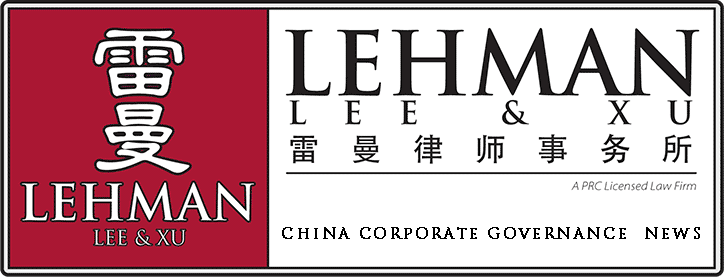

Attorney Edward Lehman, Managing Director of LEHMAN, LEE
& XU working 27+ years on the ground in mainland China.
Connect with Attorney Edward Lehman
 |
LEHMAN, LEE & XU China Lawyers |
China Corporate Governance News |
Aug 04, 2015 |
 |
Attorney Edward Lehman, Managing Director of LEHMAN, LEE & XU working 27+ years on the ground in mainland China. Connect with Attorney Edward Lehman |
The China Corporate Governance News keeps you on top of business, economic and political events in the China. |
|
|
In the News |
Hugh Young: China’s road to redemption |
We have always liked the China story: the rise of the middle class, urbanisation, high savings rates and pent-up demand. China’s President Xi Jinping, the nation’s most powerful leader since Deng Xiaoping, wants to be remembered as the statesman who turned the “Chinese Dream” into reality. At the heart of this aspiration is a blueprint for far-reaching reforms that promise a fresh start for the country. But after decades of turbo-charged growth, China is now counting the cost: environmental degradation, social injustice and a broken economic model. China appreciates it needs to shift away from capital expenditure and an excessive reliance on exports towards a more balanced economy supported by domestic consumption. The authorities have the flexibility to manage this transition successfully. From an investor perspective, reform cannot begin too soon. Despite decades of impressive headline growth, China’s stocks have languished for reasons that include poor governance, dominance of state-owned enterprises, low or minimal shareholder accountability and the lack of value creation. The lack of corporate governance has been the single most important obstacle for us. We still advise our clients, as a first step, to access China’s growth via companies that are listed offshore (usually in Hong Kong) where rules designed to protect investors are more rigorously enforced. Since hitting a seven-year high in June, Chinese stocks have declined sharply, triggered by a clampdown on margin finance: the use of borrowed money to buy shares. While stock market performance has been below expectations, as bottom-up stock pickers, we remain cautiously optimistic because significant parts of China’s economy are not in state hands or subject to excessive control. These companies play an increasingly important role in job creation and need capital to grow. If the banks are constrained as sources of funding because of tighter liquidity, the stock markets can help. Consumption The consumer story is attractive because boosting domestic spending forms a central component of China’s reform agenda. This translates into demand for property, travel, mobile phones, domestic appliances and supermarket groceries. We are great believers in this story in part because we like businesses that are simple and easy to understand. We favour travel-related businesses that are set to benefit as more Chinese achieve aspirational lifestyles. Other areas to benefit from greater affluence include insurance and healthcare. We are less enamoured of property because of the cyclical downturn and debt build-up. Despite the hype around e-commerce, the best opportunities are listed overseas and shareholders rights are opaque. The authorities are committed to policies encouraging urbanisation. People in the countryside and migrant workers living in cities will be given legal rights that free up more disposable income, which will eventually swell the ranks of the middle class. With one of the highest savings rates in the world, spending should be underpinned for years to come. Less ‘government’ The issue of state ownership is a complex one. For its admirers, China has perfected its own brand of state-run capitalism. The biggest firms are unimpeded by real competition. They have been able to undercut rivals abroad thanks to cheap funding. The better-run firms are commercial and may be attractive to outside shareholders. The worst are value destroying: coal miners, steelmakers and industrial manufacturers. They benefited from policies that led to over-investment. The government recognises the need to slim down bloated state-controlled firms to achieve greater efficiency. That discipline, however, has to come from the markets. The banking sector is arguably the most important test bed for liberalisation. Policymakers have proposed changes that include allowing market forces to determine bank deposit rates and to set the value of the yuan. The quality of companies raising money on the stock exchange should improve, as firms will need to compete more effectively for savings that could sit in bank accounts offering a competitive interest rate. Hidden value We have been investing in Asia long enough to realise that even a disappointing market can hide individual companies that excel at what they do and reward their shareholders appropriately. There are companies that have successfully navigated repeated cycles of boom and bust, arbitrary access to credit and unpredictable officialdom. They are here for the long term and are well placed to benefit from comprehensive structural reforms that will lay the foundations for the next stage of China’s growth. http://www.fundweb.co.uk/opinion/hugh-young-chinas-road-to-redemption/2022664.article |
|
|
|
|
| Proud Member of |